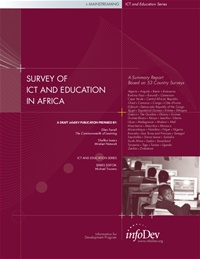
Word of Président
Africa has encountered its destiny. Pressured by accelerated globalization, Africa faces a dramatic dilemma: establish a system of high-quality education quickly or regress! Also, African decision makers are seriously involved in “opening access to education for increasing numbers of children, teens, and adults, reducing disparities and exclusions, and integrating education with economic, social and cultural progress.”
But how can one guarantee a high-quality education for the youth of Africa if, in the time of the Internet, the continent is still a victim of serious inequality in the realm of information and technology? To address this challenge, volunteers from different sectors of education, communication, and information technology have worked towards reducing the disparity between Africa and other continents. They offer young African learners the opportunity to have access to the Internet, to have a means of gaining knowledge, to become educationally competent, and to grow in conditions comparable to those of schoolchildren in developed countries. This is SchoolNet Africa’s mission: to contribute, in its own way, to the African renaissance, creating conditions in schools that facilitate the wealth of creativity stemming from the talents of African youth. Since its creation in Okahandja (Namibia) in July of 2000, SchoolNet Africa has promoted high-caliber education with the use of information technology and communication (ITC) by way of these diverse programs:
Since the debut of SchoolNet Africa, an important path has been forged, but new challenges have arisen. In June of 2006, the General Assembly of SchoolNet Africa decided to transfer its headquarters from Johannesburg (South Africa) to Dakar (Senegal), decentralize the administration of its programs, engage national SchoolNet Africa organizations more fully, and reinforce partnerships with ministers in charge of education and formation in Africa, the political bodies controlling multilateral and bilateral cooperation, research institutions, and all the amazing volunteers devoted to the schools and youth of Africa.
This new structure has now taken form and everyone is invited to contribute to achieving better education for Africa’s youth.
Professor Babacar Fall
President of SchoolNet Africa
Université Cheikh Anta Diop – Dakar - Sénégal
Survey of ICT and Education in Africa : Summary report based on 53 countries surveys
 There is a great deal of variance in ICT policies for education among the African countries surveyed. South
Africa clearly is unique in terms of being able to move its ICT agenda forward. Several of the countries of
North Africa that have both resources and high bandwidth connectivity with Europe have also been able to
make excellent progress implementing their ICT plans. Those countries that are steadily moving to sustainable
economies (Mauritius, Ghana, and Botswana, for example) constitute another group making remarkable
progress... More details
There is a great deal of variance in ICT policies for education among the African countries surveyed. South
Africa clearly is unique in terms of being able to move its ICT agenda forward. Several of the countries of
North Africa that have both resources and high bandwidth connectivity with Europe have also been able to
make excellent progress implementing their ICT plans. Those countries that are steadily moving to sustainable
economies (Mauritius, Ghana, and Botswana, for example) constitute another group making remarkable
progress... More details


